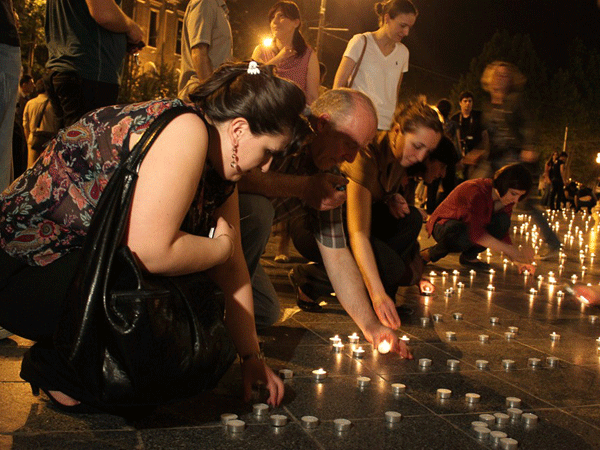
People paying respect to the victims of police brutality one month after May 26, 2011. According to Human Rights Watch, police assaulted at least ten journalists, detained two, took or damaged equipment and confiscated press cards.
TBILISI, DFWatch – Georgia is no longer the leading country in the South Caucasus in terms of media freedom, according to Reporters Without Borders.
Georgia is on a shared 104th place among the 179 countries listed. Last year, Georgia was number 100 on Press Freedom Index, as the ranking list is called.
This year’s lower ranking is explained as a result of the handling of events surrounding May 26, 2011, when police violently dispersed a peaceful anti-government rally in front of the parliament building in Tbilisi.
“Georgia is paying the price for the violent dispersal of an opposition demonstration in May and the persistent harassment of journalists and bloggers suspected of sympathizing with Russia,” the report says.
It was just past midnight May 26 when police moved in to clear the area in front of parliament to make way for a military parade in the morning to mark Georgia’s independence day. With this as justification, the government sent in police and other forces which exerted violence towards people who were there, using tear gas, rubber bullets, batons and a sonic weapon. Four people died; three protesters and one policeman.
Not only peaceful citizens, but also journalists were affected. The Interior Ministry recently accepted responsibility for this in a lawsuit launched by a group of media companies and individual journalists, asking for compensation for damaged equipment and physical injuries that day.
In the wake of May 26 there was an extensive crackdown on oppostion groups throughout the country, which sent many of them away to prison for up to ten years. There were also cases against the media, which some argue were retribution for journalists who covered May 26.
In July, police arrested four photographers on spy charges, a controversial case which was met with calls for openness from international organizations including the International Federation of Journalists. Ultimately the case was settled by a plea bargain agreement.
Since the documents in the case are still classified it is hard for outside observers to judge whether the spy charges were justified or a form of retribution against the photojournalists for pictures they had taken of police brutality May 26, but at least one of the accused wrote that he believed it was retribution.
Also an unscheduled audit by tax authorities of media house Palitra is seen by many as retribution for May 26 related reporting. Palitra published a video which undermined the Interior Ministry’s account of how a policeman died in the tumultuous, rainy night.
While it was a bad year for Georgia, Armenia jumped up 24 places to 77th place, ahead of Georgia (104), Azerbaijan (162) and even Turkey (148). Russia is on 142th place before Turkey.
Armenia’s good placement is not an indication of improvements, the organization explains, only that the negative effect has waned after a brutal crackdown in 2008 in connection with a disputed election.





Leave A Comment
You must be logged in to post a comment.